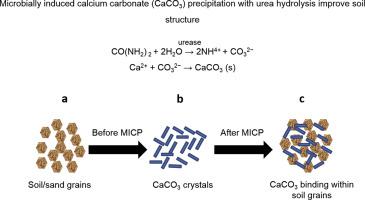当前位置:
X-MOL 学术
›
Ecol. Eng.
›
论文详情
Our official English website, www.x-mol.net, welcomes your
feedback! (Note: you will need to create a separate account there.)
Application of microbially induced calcium carbonate precipitation with urea hydrolysis to improve the mechanical properties of soil
Ecological Engineering ( IF 3.9 ) Pub Date : 2020-06-01 , DOI: 10.1016/j.ecoleng.2020.105885 Muhammad Naveed , Jiangong Duan , Shahab Uddin , Muhammad Suleman , Yang Hui , Hongyu Li
Ecological Engineering ( IF 3.9 ) Pub Date : 2020-06-01 , DOI: 10.1016/j.ecoleng.2020.105885 Muhammad Naveed , Jiangong Duan , Shahab Uddin , Muhammad Suleman , Yang Hui , Hongyu Li

|
Abstract Microbially induced calcium carbonate precipitation (MICP) is a process that has emerged as an alternative and sustainable ground improvement approach in geotechnical and civil engineering for improving the mechanical properties of soil. Urease-producing bacteria accelerate the process of MICP by converting urea into ammonium and carbonates ions. Precipitated CaCO3 acts as a binder to adjacent soil particles, forming larger aggregates that eventually lead to increased soil strength and stiffness. In this review, we explore the importance of MICP to improve the mechanical properties of soil so that it will be more suitable for construction and environmental purposes. Furthermore, different treatment processes and environmental factors are also discussed that affect the production of urease and carbonate precipitation. This method has many features as compared to the conventional methods. For example, it is eco-friendly, improves vegetation, bears the lower operational cost, and is sustainable. MICP is mostly studied for lab-scale and limited to field-scale application. In order to achieve its large-scale application in natural and engineered conditions, we need to encourage collaboration among the microbiologists, geologists, and geotechnical engineers throughout the world.
中文翻译:

尿素水解微生物诱导碳酸钙沉淀改善土壤力学性质的应用
摘要 微生物诱导碳酸钙沉淀 (MICP) 是一种在岩土工程和土木工程中作为替代和可持续的地面改良方法出现的过程,用于改善土壤的力学性能。产脲酶细菌通过将尿素转化为铵离子和碳酸根离子来加速 MICP 的过程。沉淀的 CaCO3 作为相邻土壤颗粒的粘合剂,形成更大的聚集体,最终导致土壤强度和刚度的增加。在这篇综述中,我们探讨了 MICP 在改善土壤力学性能方面的重要性,使其更适合建筑和环境目的。此外,还讨论了影响脲酶和碳酸盐沉淀产生的不同处理工艺和环境因素。与传统方法相比,该方法具有许多特点。例如,它是生态友好的,改善植被,承担较低的运营成本,并且是可持续的。MICP 主要针对实验室规模进行研究,仅限于现场规模应用。为了在自然和工程条件下实现其大规模应用,我们需要鼓励全世界微生物学家、地质学家和岩土工程师之间的合作。
更新日期:2020-06-01
中文翻译:

尿素水解微生物诱导碳酸钙沉淀改善土壤力学性质的应用
摘要 微生物诱导碳酸钙沉淀 (MICP) 是一种在岩土工程和土木工程中作为替代和可持续的地面改良方法出现的过程,用于改善土壤的力学性能。产脲酶细菌通过将尿素转化为铵离子和碳酸根离子来加速 MICP 的过程。沉淀的 CaCO3 作为相邻土壤颗粒的粘合剂,形成更大的聚集体,最终导致土壤强度和刚度的增加。在这篇综述中,我们探讨了 MICP 在改善土壤力学性能方面的重要性,使其更适合建筑和环境目的。此外,还讨论了影响脲酶和碳酸盐沉淀产生的不同处理工艺和环境因素。与传统方法相比,该方法具有许多特点。例如,它是生态友好的,改善植被,承担较低的运营成本,并且是可持续的。MICP 主要针对实验室规模进行研究,仅限于现场规模应用。为了在自然和工程条件下实现其大规模应用,我们需要鼓励全世界微生物学家、地质学家和岩土工程师之间的合作。











































 京公网安备 11010802027423号
京公网安备 11010802027423号